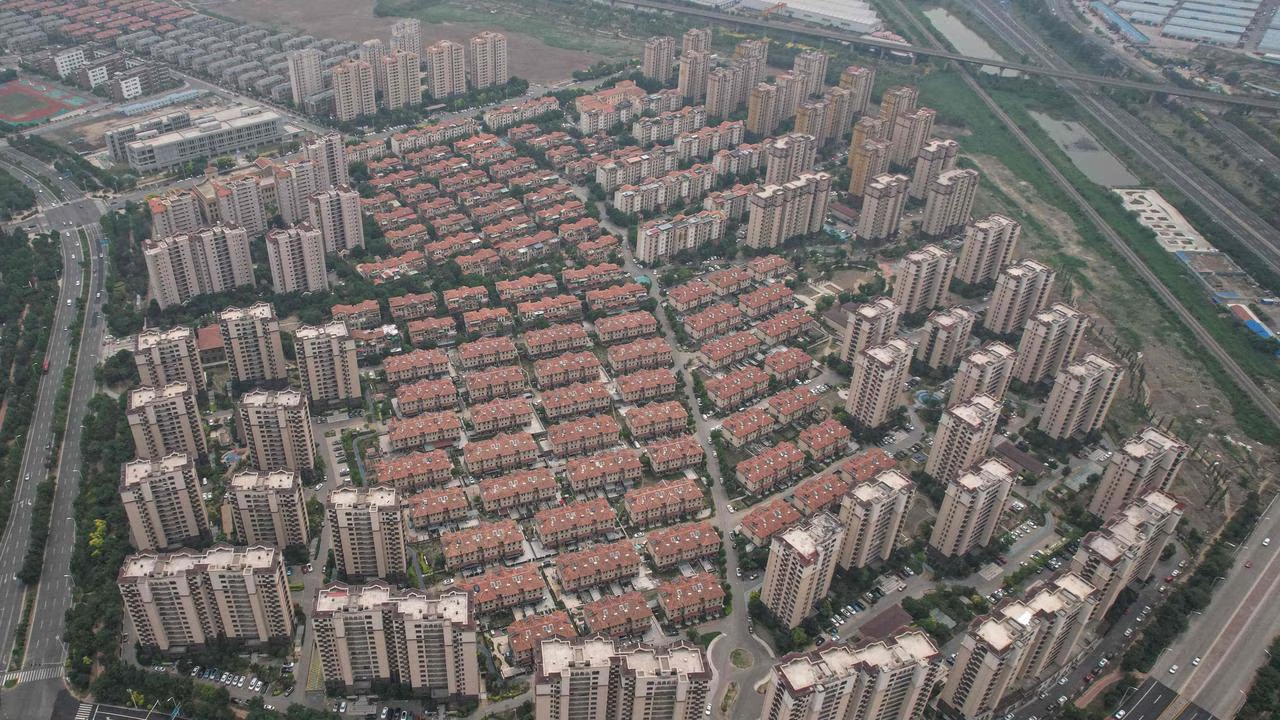‘Fictitious wealth’: Aus homeowners warned

Global stock markets are continuing to fall today amid warnings that Australian homeowners’ “ficticious wealth” will be hit hard by huge economic headwinds in China.
Stock markets fell around the world as traders awaited key earnings reports, notably from $5 trillion chip giant Nvidia, amid concerns that the US Federal Reserve could hold off on further rate cuts this year.
On Wall Street, the Dow retreated 1.2 per cent while the tech-heavy Nasdaq lost 0.8 per cent. The broader-based S&P 500 slid 0.9 per cent.
The sell-off has hit Australia hard again too today, with the ASX200 falling a hefty 1.59 per cent as of 1.45pm
Investors are hoping for another blockbuster quarter from the world’s only $5 trillion company — but anything short of perfection could result in panic.
‘Fictitious wealth’: Aus homeowners warned
Amid the economic turmoil affecting the globe, Australian homeowners have been singled out as having among those with the most to lose.
This is because of fears over the Chinese economy. Over the weekend it was revealed Chinese house prices have been falling for 40 straight months, interestingly while its gross domestic product growth this calendar year grew from 4.9 per cent to 5 per cent.
Michael Pettis, senior fellow at the Carnegie Endowment for International Peace and one of the world’s most respected China commentators, said this was cause for concern for Aussies.
He told the Australian Financial Review China was prioritising “unhealthy” GDP growth —powered by debt-fuelled public investment in manufacturing and infrastructure.
MORE: Revealed: Hottest property markets around the nation
In the short-term that could be a boon for Australia as it continues to sell minerals to China — as it has done for the best part of 25 years.
However, the fact that house prices are falling in China shows that Beijing’s efforts to rebalance its economy by boosting consumption are falling short so far.
Mr Pettis said China may be forced to suddenly rebalance its economy in 2-3 years, largely because of its enormous level of debt, which would spell trouble for Australia as it would buy far less of our minerals.
Mr Pettis is concerned this moment would expose the underlying weakness and structural problems in the Australian economy — like low productivity and inflated house prices.
“Many people see real estate prices as a good thing. You’re getting richer, but you’re really not,” Mr Pettis said. “The wealth of Australians, like of any other country, is simply the total value of goods and services that you produce. So when real estate prices go up, the question is, does that cause you to produce more or less?
“Probably less because high real estate prices are a tax for businesses. So I think these rising real estate prices have to be addressed. I think the further they go on, the more strain they put on the economy. They hide the strain by this creation of fictitious wealth, but they are a real strain.”
‘Fear market’ erupts
This all comes as global stock markets are falling. The sell-off has dragged CNN’s Fear & Greed Index sharply lower. The gauge — which tracks seven indicators including market momentum and stock price strength — dropped to 14 out of 100 on Monday.
It’s the weakest reading since April, when President Donald Trump imposed higher-than-expected tariffs.
Europe lacked inspiration too with the DAX closing off 1.2 per cent while London and Paris lost marginal ground.
Major Asian indices had earlier finished lower as well amid simmering tensions between China and Japan which hit tourism and retail firms on Tokyo’s exchange.
Besides Nvidia, which dropped 1.9 per cent, US retailers Home Depot, Target and Walmart are also set to release their earnings reports.
Those will be monitored for signs of how consumers are faring as President Donald Trump’s tariffs bite.
Traders are also awaiting US government data on how the labour market fared in September. The numbers are due for publication on Thursday, after the end of the longest government shutdown in US history.
“It’ll be the first glimpse of some macro news” that could provide hints on the Fed’s preferred path for interest rates moving forward, said Peter Cardillo from Spartan Capital Securities.
Among companies, he added: “It’s all up to Nvidia, whether or not it can turn the souring negative sentiment on the AI sector.”
MORE: Australia’s most undervalued and overvalued suburbs
Dave Grecsek of wealth management firm Aspiriant added that if Nvidia could meet high expectations, “that could sort of stabilise the market a little bit.”
The European Union on Monday cut its eurozone growth forecast for 2026 as risks from international trade and geopolitical tensions weighed on Europe’s economy.
Investors have in recent weeks reconsidered prospects for US rate cuts and the AI-fuelled tech rally that had lifted several markets to record highs.
Traders are keenly awaiting the release of several reports — including on jobs and inflation — that had been held up by the record US government shutdown that ended last week.
With data releases delayed, “chances are growing that the Fed will avoid changing monetary policy when the economic outlook remains murky,” said Kathleen Brooks, research director at trading group XTB.
Fed boss Jerome Powell signalled last month that a December cut to borrowing costs was not assured, adding to uncertainty.
All eyes are on this week’s earnings update from Nvidia, the world’s most valuable company, which late last month hit a market capitalisation of $5 trillion before slipping back.
For now, Bitcoin suffered from the uncertain climate on trading floors. The cryptocurrency had climbed to a record high of $126,251 on October 6, buoyed by Trump’s pledges to ease regulation on the crypto sector, but has fallen from that level to around $91,634.45.
Read related topics:China





